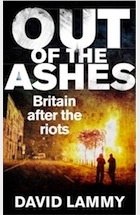 My review of David Lammy's interesting book, "Out of the Ashes", has appeared on the TRG's Egremont blog, and is reprinted below:
My review of David Lammy's interesting book, "Out of the Ashes", has appeared on the TRG's Egremont blog, and is reprinted below:The last time there were riots in Tottenham, the local MP’s response was to crow that the “police got a bloody good hiding”. He may have been chiming in with the views of many of his constituents, but in the aftermath of riots that encompassed the brutal murder of a police constable it was never going to be a response that scored highly on the constructive engagement scale.
This time, the local MP, who was a boy growing up near the Broadwater Farm estate in 1985, raced back from his holiday as soon as he heard of tension in Tottenham following the shooting of Mark Duggan, spent hours and days in constructive engagement with the local community and the police, and has now published a book of his reflections on the state of urban Britain. But then, David Lammy has always been a very different character from his predecessor.
The former Higher Education minister hasn’t necessarily been one of New Labour’s more impressive spokesmen, but in his post-riots book “Out of the Ashes” he seems to have discovered a political voice that might just be the making of him. No-one can doubt Lammy’s credentials in reflecting on the lessons of Tottenham in 2011. Brought up in the area he now represents, a boy in a single parent (his mother) family from the age of 12, and a black student in a private white-dominated school for much of his secondary schooling, Lammy has personal credentials aplenty in casting his eye over the inner urban landscape that exploded so suddenly last summer. He also understands how government works, and has a close knowledge of the mechanics of the New Labour project under both Blair and Brown.
Yet his is no ‘angry voice’ and it is certainly not an apologia for New Labour. It is a very personal, dignified and thought provoking reflection that offers plenty of food for thought when it comes to devising policies to regenerate a Britain whose broken state Lammy firmly recognises. It is a virtue of his book that it does not represent some dully partisan approach but instead seeks to find practical ideas in community projects which have already been tried and tested. Lammy may write as a Labour MP, but there is much here that One Nation Tories could readily identify with.
Not that there isn’t anger in “Out of the Ashes”. Go to the book’s last chapter, “Banks and Bureaucrats”, and you’ll find an eloquent and condemning account of the powerlessness of the modest citizens left homeless by the riots, and treated mercilessly by the banks. As Lammy recounts the wretched behaviour of banks whose own irresponsibility caused them to be bailed out to the tune of billions of taxpayers’ pounds, you can almost hear the levels of indignation rising and you start to ask why every representative doesn’t regard the contemptuous treatment of his constituents with similar outrage.
Even here, Lammy soon morphs into the would-be fixer, examining how bureaucracy might just work in his constituents’ defence. This is his virtue. Unlike socialists of yore, the current MP for Tottenham sees people in small community terms, to be helped and engaged with by similarly community-based ideas but backed by the power of the state. The key is that the state comes second, not first.
Some of Lammy’s themes will chime with even the most vigorous social conservative. He has no truck with the liberal notion that fathers in families don’t matter. After all, he grew up without one for a significant period of his childhood, and hasn’t put on rose-tinted spectacles to view the experience subsequently. He wants strong male role models in deprived urban areas who are not vacuous celebrities or weapon toting gangsters. He believes every sinew should be strained to keep fathers, especially separated ones, involved in the child rearing process.
On criminality, he believes in punishment, but once punishment has been made he wants effective rehabilitation and offers an interesting – if rather uncosted – form of ‘social impact credits’ to pay for it. This is where the Lammy medicine veers away from the world view of many Tories – he knows his proposals will cost money, and is happy to advocate this. After all, he is not planning to cut the state. Not when it has so much to do.
Lammy’s Britain is broken because too few jobs are around to give people the necessary self-worth, and because poverty is surrounded by plenty, and because the voiceless see the influence wielded by the small community of the well connected. He takes examples that look like the Big Society in action on a small scale, but believes that they need proper state support to become full blown solutions.
He writes with authority and integrity because, whatever else you think of him, he knows his constituency intimately and has been there when a promising young man has been gunned down by a gang emptied of the last signs of human morality, or when a young offender has been failed by the would-be system of rehabilitation. When a politician writes with this level of sincerity, knowledge and commitment, he deserves a hearing. From all parties.


No comments:
Post a Comment